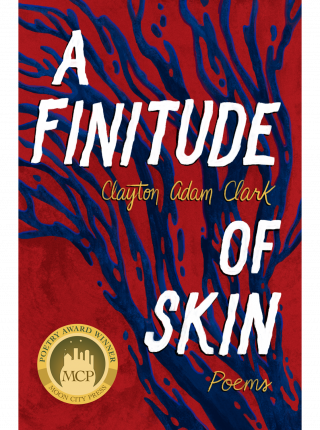Winner of the 2019 Moon City Poetry Award
“Contour lines // down your side of the bed …”: Such lines mark Place Where Presence Was, Bret Shepard’s debut full-length collection and winner of the Moon City Poetry Award.
Here, Shepard probes intimacy and its absence with endlessly inventive ways of approaching his theme. In one poem, X marks the spot (on a calendar); in another, the title poem, the invisible path of his lover through his home are viewed as marks of elevation. For Shepard, the map is a tool to make sense of the world and our relationship to it, and the poems themselves add another dimension from which to view the spaces between us.
These are poems of longing and a recognition of all the ways desire stretches distance ever farther —and of “the necessary ways we quiet / into nothing at all.”

From Alaska, Bret Shepard has lived throughout the Pacific and Arctic coasts. He is currently an assistant professor of English at Cabrini University. His books include Negative Compass, winner of the Wells College Chapbook Prize, and The Territorial, winner of the 2020 Midwest Chapbook Award from GreenTower Press and the Laurel Review.
“Near the closing of Bret Shepard’s Place Where Presence Was, a speaker observes that ‘[t]o add ex- to anything is violent.’ In this unnerving, riveting collection, readers enter a domestic space in which two people play out the end of love, moving back and forth between the twin impulses to strike and to hold. This is a book of compasses and maps, of spare, restrained poems that circle around loss and of being lost. Whether we walk through the modern rupture of the city or stand at the water’s edge, these poems suggest that intimacy is unsustainable, that desire turns us monstrous, and that absence of the beloved is more palpable than any breathing body we might touch.”
—Jehanne Dubrow, author of Wild Kingdom and Simple Machines: Sonnets
“‘To achieve a quiet mind you must first / hear it speak.’ With a sharply elegant lyricism, Bret Shepard’s Place Where Presence Was reanimates our most persistent philosophical quandaries of time, space, and being: How can ‘I’ be ‘I’ and not ‘you’? These poems interrogate memories and tread familiar landscapes charged with the undertow of elegiac human sorrow. ‘There was a We in weather,’ Shepard writes, reminding us that some forces cancel each other out and leave us singular—newly creatured and strange.”
—Emily Rosko, author of Weather Inventions and Prop Rocketry
“We are all born into this world lost, and we search for our place within it by fashioning a compass out of our experiences. Bret Shepard’s debut collection, Place Where Presence Was, is a smart, intellectual interrogation of the ontological arguments that exist underneath the surface of our daily lives. Shepard deconstructs loss and desire by meditating on the fallibility of memory, the fluidity of time, and the destruction of the physical landscapes that we inhabit and share. With a sparse aesthetic, classical allusions, and sharp intelligence, Shepard’s poems explain how “myth enters the body,” and, in the face of pain and loss, ‘life still exists in doses of moments.’ This book is a shining example of the mind’s ability to triumph.”
—John McCarthy, author of Scared Violent Like Horses
“A beautiful reflection on the world around as well as the world within, Place Where Presence Was draws out the splendor of spaces that often go unnoticed or unspoken. These are the hidden backyard places, the abandoned cars and memories and bodies that are around us every day. Shepard employs form and language that inspires real thought about environments, communities, and selves. This wonderfully intelligent collection of poems offers new ways of seeing the world at a time when we need such perspective more than ever.”
—Sarah Nolan, author of Unnatural Ecopoetics: Unlikely Spaces in Contemporary Poetry
“‘Though I’ve no exact way to say where I am, which is to say know who I am,’ Bret Shepard writes, ‘these words are the only map.’ In Place Where Presence Was, his attempt ‘to say where’ and ‘to know who’ we are, language simultaneously becomes the means of mapping the world and the landscape itself as he adopts the dual role of cartographer and world-builder. His collection is like a globe, both representation and reality, in which each poem is a distinct region encompassed by its opening and closing words. At the same time, the collection’s linguistic terrain—concrete yet paradoxical, spare yet stratified—is present in every poem, drawing its own fluid borders with ‘lines the shape of memory.’ Shepard stands at the frontier where ‘words / form our geology,’ where the body is both position and possibility. Follow him wherever he leads.”
—Jose Reyes, author of Present Values
“What happens when you combine the taut precision of mathematical equations with the sumptuousness of nude paintings? In Place Where Presence Was, we see poetry whittled down to its barest core, its round bloody bones, flavored with subtle humor as they pursue the questions that define our humanity in the first place.”
—Michael Meyerhofer, author of Ragged Eden
Distributed for Moon City Press.





